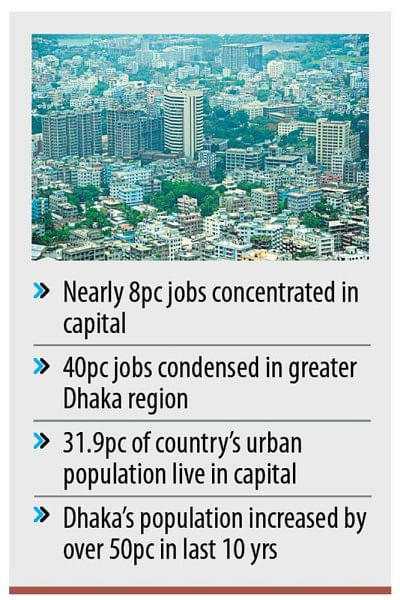Dhaka’s overgrowth costs up to 10pc GDP

Nearly eight percent of jobs in the country are concentrated in Dhaka city, and 40 percent are condensed in the greater Dhaka region, which includes Gazipur and Narayanganj city.
Such extreme concentration of population and economic activity in the capital are having negative impacts on the national economy.
A study in this regard was presented yesterday by Ahmad Ahsan, former lead economist of the World Bank and director of Policy Research Institute of Bangladesh, at the "Annual BIDS Conference on Development 2021". The event was organised by Bangladesh Institute of Development Studies (BIDS) at a city hotel.
According to the study, some 31.9 percent of Bangladesh's urban population live in Dhaka, whereas the country's major cities that have over a million inhabitants contain only 3.5 percent of the urban population.
In the last 10 years, Dhaka's population has increased by more than 50 percent.
In 2017, per capita income and GDP was 11 percent lower than its potential, due to excessive concentration of resources and economic activities in Dhaka. In 2019, GDP loss amounted to USD 35 billion.
At present, Bangladesh is losing six to 10 percent of its GDP, because Dhaka's growth has crossed the optimum rate.
Ahmad further revealed that Dhaka's economic overgrowth has slowed down the reduction of urban poverty in the country significantly.
According to his study, from 2010 to 2016, extreme poverty rate in rural areas has declined from 21.1 to 14.9 percent, whereas there was virtually no change in urban poverty rate. In 2010, the urban poverty rate was 7.7, and in 2016, it was 7.6.
Traffic congestion in Dhaka causes losses amounting to 2.9 percent of Bangladesh's GDP, he said, citing a 2011 estimate.
There are also environmental and health costs resulting from environmental degradation. These should also be taken into consideration, he said.
Ahmad added that when compared to cities of developing countries, Dhaka's share of the national GDP is among the highest in the developing world.
He suggested policies for decentralisation, de-concentration and devolution to mitigate the crisis.
It is impossible for the 35 development-related ministries headquartered in Dhaka to ensure well-coordinated urban planning and management for the country's 340 city and municipal corporations, he said.
"These government agencies must be de-concentrated and decentralised, which means locating them out of Dhaka and making quality services of these offices available in towns and other cities," he continued.
"Empower city governments and implement laws on decentralisation," he said.

 For all latest news, follow The Daily Star's Google News channel.
For all latest news, follow The Daily Star's Google News channel. 




Comments